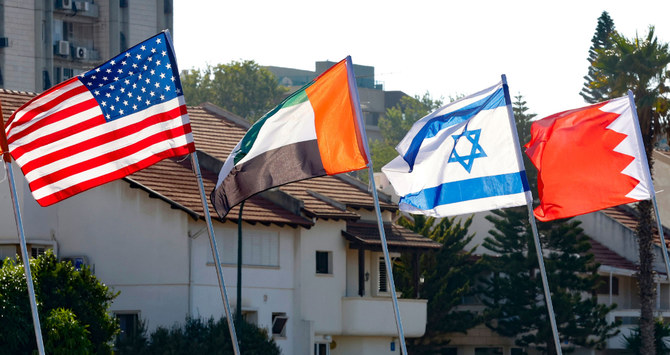CHICAGO: The historic accord between the UAE and Israel, which will be signed this week at the White House, will create a “new environment” to achieve peace, the director of policy planning at the Emirati Foreign Ministry told Arab News on Monday.
The UAE remains committed to the interests of the Palestinians and to the two-state solution, said Jamal Al-Musharakh, adding that peace between Israelis and Palestinians is achievable.
“We haven’t abandoned the Palestinians,” he said. “With the involvement of the US in this peace process, conversations can be more honest. Opportunities and differences can be discussed. This is the point of dialogue — that we can really get past previous lack of clarity.”
The entire region will benefit from the UAE-Israel accord.
“There’s much optimism and hope in this agreement,” Al-Musharakh said. “It’s a strategic shift. The deal provides a more optimistic view of the future, and will result in benefits for all in the region, including the Palestinians. But the Palestinians need to engage in the peace process themselves.”
The foundation of the accord is based on “optimism and hope,” he added. “The region needs hope. It has been through much turmoil and despair.”
Opinion
This section contains relevant reference points, placed in (Opinion field)
The accord “offers an opportunity for the Palestinians and the people of the Middle East to be able to look past previous pessimism and to have a more optimistic future,” he said.
The accord “will stand all challenges,” he said, adding that the UAE pursued it at the urging of leaders from the Middle East and the international community.
“The international community was concerned about Israel annexing Palestinian lands,” he said. “There was a lot of outreach to us to use our diplomatic efforts to reach a point that would preserve the two-state solution and thus halt annexation.”
The UAE-Israel deal comes 27 years almost to the day after Israeli Prime Minister Yitzhak Rabin and Palestine Liberation Organization Chairman Yasser Arafat shook hands on Sept. 13, 1993, at the White House.
US President Donald Trump said he will host a similar peace-signing ceremony this week at the White House between Israel, the UAE and Bahrain, which also announced an agreement with Israel.
Al-Musharakh said he could not provide details of the signing, but emphasized that the UAE-Israel accord “creates an environment in the Middle East in which a genuine peace can be achieved.”
He added: “The UAE is home to over 200 nationalities. We expect to advance areas of education, health, business and the needs of the people, not just in the UAE but also in the region. This agreement is about the region.”
The UAE celebrates its 50th anniversary this year and will host the global mega-event Expo 2020 Dubai, the opening of which has been delayed until next year due to the coronavirus pandemic, he said.
Expo officials said the new opening date is Oct. 1, 2021, and it will continue through March 2022. “Israel will be a part of Expo 2020, and we look forward to it,” Al-Musharakh said.
In announcing the Expo, the UAE has promised to focus on a collective desire for new thinking to identify solutions to some of the greatest challenges of our time. The peace accord comes as a result of that spirited thinking, he added.
“The accord has been met with broad international support. There’s clear recognition of our aim to safeguard the two-state solution and advance general prosperity,” he said.
“The message remains a hopeful one. The end solution lies in the hands of the Palestinians and Israelis themselves,” Al-Musharakh added.
“The UAE is committed, and always will be committed, to our longstanding commitment to the Palestinian people in advancing peace-making efforts to the region’s benefit,” he said.
“We’ll never abandon the Palestinians. They’re important and we support their rights. We stand by the two-state solution. We’re committed to Arab decisions about the Palestinians.”
The normalization of relations between the UAE and Israel is a historic step for progress in the region, UAE Foreign Minister Sheikh Abdullah bin Zayed meanwhile said, in a report from news channel Al-Arabiya on Tuesday.
The progress in establishing the Palestinian state is vital at this stage inasmuch as the agreement, which is about to be signed at the White House, stopped Israeli annexation activities in the West Bank, he added.
The White House said in a statement: “The Arab world is experiencing the most rapid geopolitical transformation in more than a generation.”
It added: “As more countries normalize relations with Israel, the region is becoming more stable, secure, and prosperous. Expanded business and financial ties between economies will accelerate growth and economic opportunity across the region. The United States will continue to stand with the people of the region as they work to build a brighter, more hopeful future.”


























